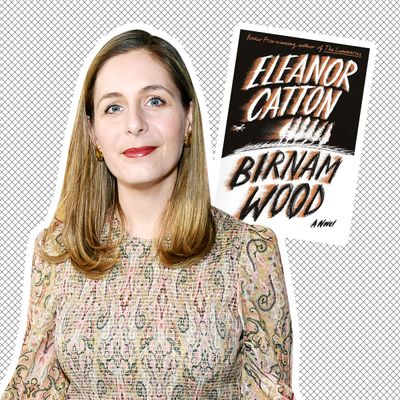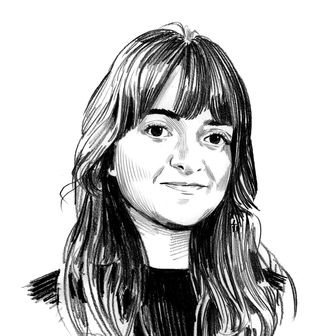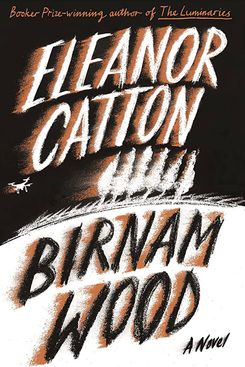
In 2013, Eleanor Catton became the youngest-ever Booker Prize winner for The Luminaries, an 832-page best seller set during New Zealand’s opium-hazed gold rush. Oddly, her new book is much more millennial than its period-piece predecessor was. A psychological thriller centering around a collective of anti-capitalist 20-somethings who forge an unlikely alliance with a bunker-building billionaire, Birnam Wood is insistently contemporary despite the title’s Shakespearean reference. In other words, it’s bleak.
The novel begins with a deadly landslide caused by illegal mining activity in a supposedly pristine national park. Everything that follows serves to undermine any preconceptions that international readers might have about New Zealand. It’s decidedly not a liberal utopia. Birnam Wood’s millennials have come of age in the kind of country where a progressive political leader can be forced to resign following threats to her physical safety, a rapidly changing climate is ruining livelihoods, and a property crisis has made it impossible for most people under the age of 60 to afford permanent housing without inheriting the down payment or releasing music under the moniker “Lorde.” Most of the novel’s younger characters lack ambition beyond basic survival, and even this becomes a tricky proposition in the novel’s gripping final third.
It turns out that life isn’t much easier in the southern hemisphere. “A lot of New Zealanders — and I count myself in this — have this automatic sense of superiority that is absolutely not born out in the facts,” says Catton from her adopted home in Cambridge, England. “It was something that I wanted to satirize.” A discomforting read, Birnam Wood will dispel your fantasies about riding out the apocalypse in the antipodes — or at least make you feel a little guilty about having them.
What’s it like doing publicity for a book about ecological disaster just a couple of weeks after Cyclone Gabrielle?
It’s just horrific. I’ve been following the news from afar, these human stories of families and their livelihoods being washed away, and it’s harrowing. Because this could be any one of us now at any time. I just don’t know what to do, basically. You donate money to the rescue efforts and try to keep abreast of the news, but beyond that, you just have to hope for a change in global leadership. Try and do your bit to bring that change about.
Was that what brought you to write about environmental collapse in Birnam Wood?
The threat of environmental collapse poses quite a difficult challenge for a novelist in that the responsibility for it is so diffuse. It’s so random. In a sense, a novel has a funny relationship with randomness, because everything is in there because the author has chosen to put it there, and there can be unexpected elements or surprising elements, but there can’t be truly random elements. It’s only the illusion of randomness. In a way, I didn’t really set about writing a book that’s an “ecological thriller,” and to be perfectly honest, I still don’t really know what that is.
Good marketing copy.
From about late 2016 onward, when I was talking about the future with friends, I’d find this shared assumption that there is no future — we’re heading toward extinction fairly rapidly. I’m not sure how much of that is gallows humor or a way of talking flippantly about anxieties that are too big to name. We must not really believe that, because if we did, we’d all be in a state of emergency already, you know? Birnam Wood is a novel that deals with that anxiety in a couple of different ways, most notably that the book begins with a natural disaster that turns out not to be a natural disaster — it’s a manmade disaster. And that, in a nutshell, is climate change. The environment is in the air in the book, but I really wanted it to be about human actions and mistakes. So my focus was always on how to escalate the drama, but I didn’t feel as though I was trying to advance any kind of environmental position.
Every character is put under the microscope in this book, and you see that none of them is particularly virtuous: not the left-wing activists or the baby-boomers or the billionaires. It’s a very fair novel — were you worried about betraying the cause?
Oh yeah, terrified. But that was part of the challenge for me. I knew I wanted the book to be satirical in tone, and I didn’t want the book to flatter a particular political point of view. I was thinking a lot about flattery. A lot of our political engagement these days is mediated by algorithms and through platforms that are designed to be addictive and manipulative in various ways. We are very used to being flattered in our daily interactions. New Zealand culture in general is a culture that has a very strong expectation that its artists will flatter the country’s, frankly, quite naïve self-image.
I don’t feel like Birnam Wood is a nihilistic book, because all of the characters make choices, and those choices could have been made a different way. Tiny decisions in this book end up having enormous consequences later on. And to me, that’s an optimistic message. It’s saying that it doesn’t have to be like this. People can take a different road. That’s the way I wanted my own beliefs to come through — rather than by using any one of the characters as a mouthpiece.
I found the character of Tony really interesting. He’s an angry young man with a not-so-secret desire to become famous. What was it like to write a Bernie bro?
It was really fun, actually. I have a lot of sympathy for him. I’ve been him. I don’t share his opinions. He’s a Marxist in a way that never attracted me. I’m too much of a feminist to be attracted by that kind of Marxism. But I drew a lot from my own experiences in writing him — and that feeling when you’re advocating for your ideas but realize you’re doing it badly and you’ve lost the support of the room. That appalling sense of terror and despair when something that you’ve created has spiraled out of your control. But I think he’s also another character who thinks he has led from the head, and he has really led from the heart. He’s one of the most passionate, emotive characters in the book.
In writing about millennials, you had to write about baby-boomers. It’s not the most loving portrait of New Zealand’s property-owning class.
I suppose you can only see things from your own generation’s perspective, but there’s definitely a sense, in New Zealand at least, that it’s a country obsessed with property. To a disgusting degree. I wanted to satirize a particular kind of complacency that I think one sees a lot in New Zealand among people of a certain age, whose lives have been kind of brilliant. It has worked out really well for them. They’re incredibly wealthy, and they were helped a lot by the state, so they have no qualms about dismantling the state — as they have done consistently ever since the 1980s.
It’s one of the great blind spots of the millennial generation that they just fixate on the baby-boomers and all the ills that have been visited on their generation by their parents’ generation. There’s something quite oedipal about it — or Freudian about it. It’s so personal, because these are our parents. There’s a line in the book somewhere about Tony feeling like he’s trapped in perpetual adolescence. And that’s me. I feel very much that sense of outrage, of being denied full participation as a citizen in the society that I am going to inherit and my child is going to inherit. The idea that there is a president in his 80s — it’s just an affront. It makes me so angry — the idea that he is even considering running again.
After reading Birnam Wood, I thought a lot about Jacinda Ardern’s recent resignation speech. It was one of the most chilling things I’ve watched in a long time.
Me too.
She basically admitted that the job was too hard, that she couldn’t accomplish what she wanted to. It felt like a fitting backdrop to the book, which has a hopelessness to it.
I’m not necessarily feeling hopeless. But the hold that technology has over us, the extent to which we’re allowing our social interactions and our thoughts and memories to be conditioned, outsourced, massaged, and manipulated by these shadowy tech overlords and the devices they control — I feel very depressed about that. I think that spending time online has destroyed us and is making us feel as though things are less possible than they are. It is making us feel as though hatred is more prevalent than it really is and compromise is more impossible than it really is. So I think if these powers could be restrained and institutions defended, I do feel hopeful, but it’s hard.
I was thinking about a line in Birnam Wood early on about the character Mira. It says, “Unusually for somebody of her politics, she was untouched by depression,” because of course depression and suicide are a huge problem on the left and in activist circles. I wrote that line about Mira almost as a fantasy. Wouldn’t it be nice to be untouched by depression? Of course, she’s got other problems.
Lemoine, the billionaire character, really is terrifying. The idea of billionaires running away to New Zealand and building bunkers has become a kind of joke, but he isn’t all that funny.
I know what you mean. There’s a sense of almost congratulations in New Zealand about it. Oh, they want to come and live in little old New Zealand, you know? And they’re really rich and famous. It’s almost a point of pride for some people, but it’s so chilling. There’s something incredibly psychopathic about the control that the oligarchs around the world have.
During the pandemic, especially, for a lot of people around the world there has been this fantasy of running away to New Zealand. It must have been satisfying to refute that a bit.
There’s a way that New Zealanders can flatter themselves that they’re not a part of global injustice, that it’s something that happens elsewhere, and in New Zealand, we’ve got everything right. There’s this weird superiority. For example, in my childhood, it was very common to talk about American consumerism. You would never hear consumerism without American in front of it. And it was just bizarre — we had McDonald’s, we had Kmart. There’s this othering of injustice. But it’s funny, because I felt so strident about all of these things and wrote the book while living in the U.K. Then recently, when I went back to New Zealand for the first time, I was like, Oh it actually is really beautiful here.
I can’t believe that you went from writing a Jane Austen screenplay to this novel. Although when I was reading, I could picture it on the screen — it is a bit of a thriller.
In some ways, Birnam Wood is quite a novel-y novel. But it was my ambition in the beginning that there would be a lot of conversation in the book, that it would take seriously the extent to which we all use our phones and laptops, and you wouldn’t have one of those contemporary novels where, weirdly, nobody’s Googling each other. But equally, I wanted to make the case for the kind of interaction I think is frankly kind of impossible on social media, which is those charged conflicts and seductions that can only happen face-to-face.
The big scene where Tony disgraces himself and all of the scenes between Lemoine and Mira — I wanted them to be very seductive. There’s that famous quote by Mike Nichols — he said that every scene should be a negotiation, a seduction, or a fight. And, when in doubt, you should seduce. I love that, so whenever I wrote a scene, I thought, which of the three?
This interview has been edited and condensed.



